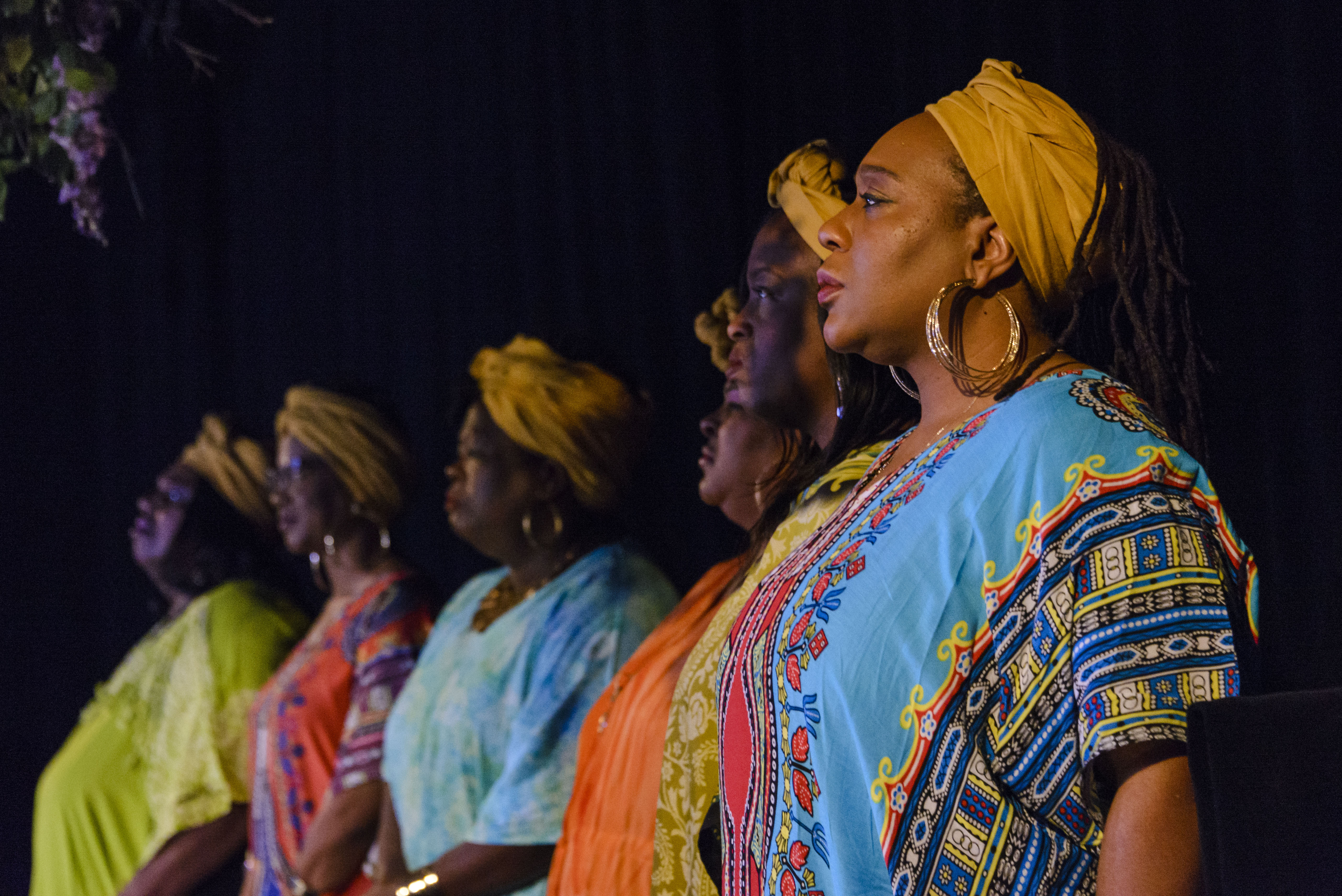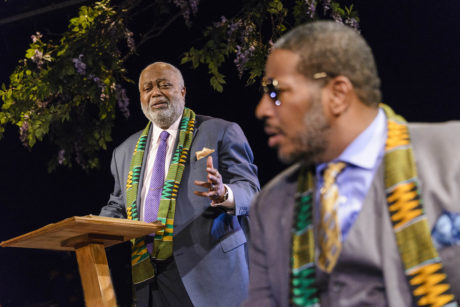The Gospel at Colonus, Avant Bard’s production of the gospel-infused Oedipus story, opened on February 27 with a sweet, bright salvo of a song. Members of the Women’s Ecumenical Choir (headed by Becky Sanders) greeted the audience one by one as they filed onto the stage, and e’Marcus Harper-Short led them in a verse of a gospel tune that made singing sound as easy as breathing. He stopped them right before they hit the final note. “Give it a real Baptist finish, now,” he said, loud enough for all of us in the audience to hear, and we laughed.

That’s The Gospel at Colonus (adapted from Sophocles’ Oedipus at Colonus by Lee Breuer) in short. It’s a gospel dynamo carried by musical talent so strong that the songs capture audience members’ hearts. The story is thin, and the direction often leaves plot ambiguities, and this would be a much bigger problem for a different show. However, The Gospel at Colonus had me literally shivering with awe at cast members’ voices one moment, then clapping and stomping the next. It’s packaged as Greek tragedy with a modern twist, but at its heart, the show is its stellar music.
Both Oedipus at Colonus and The Gospel at Colonus tell the story of Oedipus, an old man cast out because of his horrific crimes (both intentional and unintentional). A king and queen found baby Oedipus on a hillside and raised him as their son, and when Oedipus was an adult, he both killed a strange man on the road and defeated a dangerous sphinx by answering its riddles. The people of Thebes were so grateful to Oedipus for defeating the sphinx that they allowed him to marry their widowed queen, Jocasta. Eventually, though, Oedipus discovered that the man he’d killed so long ago was Jocasta’s first husband, Laius. Laius had cast out his firstborn because of a prophecy that his son would kill him. Not only had Oedipus killed his father, then, he had married and had children with his mother. He left Thebes in disgrace, along with his adult daughters, Antigone and Ismene. In the years since, he and his daughters (and sisters) have wandered, homeless.
Got all that? You don’t actually need to. The Gospel at Colonus is framed as a minister (William T. Newman Jr.) preaching to his flock from the “book of Oedipus.” Newman plays Preacher Oedipus with smooth-voiced zeal. He both teaches and bewitches the audience with his words, and his narration of the final days of Singer Oedipus (Kenton Rogers) clues you into the twists and turns of Oedipus’ fraught past.

Rogers, who is a magnificent singer with several killer solo numbers, and Newman are both talented as individuals. As the two sides of Oedipus, however, they don’t really cohere. I felt frustrated that Preacher Oedipus would say one line, only to have Singer Oedipus repeat the exact same line. I’m not sure if the issue lies with the script or the direction, but either way, this kept the plot from gathering any real momentum. The stylized acting, which sometimes veers into the overdone, doesn’t help.
The music, though – the music is a gift. Every member of the cast is a strong singer, and backed by the Women’s Ecumenical Choir, the ensemble could have filled a theater five times the size of the Gunston Arts Center with song. Lyric tenor Rafealito Ross (Chorus) sang the aria-esque “Fair Colonus” with such ringing precision that I teared up. The men of Thebes, featuring A.J. Calbert as Theseus, welcomed Oedipus into their city with the heartfelt “Never Drive You Away.” And the slimy Polyneices, played by Greg Watkins, tried to work his way back into his father’s good graces in “Evil,” which showed off the acting talents of Watkins and the singing of Gregory K. Wright (the Choragos). Antigone (Ayana Reed) and Ismene (Jessa Marie Coleman) didn’t have many solo numbers, but their sweet, nimble voices suited their characters – though I wish those characters, the show’s only women, had been given more to do.
e’Marcus Harper-Short deserves special recognition. As musical director, keyboard player, and Creon all rolled into one, he both knitted the show together (while on piano) and gave a star turn as the proud, cruel Creon. The scenes between songs often felt rushed, as if director Sandra L. Holloway wanted to get to the next musical number as quickly as possible, but Harper-Short’s Creon, uncle to Oedipus and regent of Thebes, took full advantage of his scene.
Jabari Exum’s drumming provided the frame upon which the music of The Gospel at Colonus stretched itself. He and Harper-Short had an easy command of their instruments: they were never too loud or too soft, and they complemented the singers so well that they did the work of an entire band.
Tim Jones’ simple set allowed the actors to use the thrust stage to its fullest potential. Leaves and flowers twined into the lighting grid made it seem like Colonus really was fair – like I would only have to touch the vines to feel like I, too, was in the land of running horses. Clare Parker’s costumes were versatile enough to allow the actors to switch between the flock of Preacher Oedipus and the enemies, daughters, and friends of Singer Oedipus.
What’s odd is that The Gospel at Colonus is presented as a preacher’s tale, but the show is wholly unconcerned about Christianity. Jesus never comes up. Instead, the divine force the characters mention most often is destiny. Oedipus was destined to sin against his father and his community, but he was also destined to bring peace to the place where he died. The songs of The Gospel at Colonus portray a passionate struggle with, and eventual acceptance of, fate. This is beautiful, but gospel music is a specifically Christian tradition. That’s why it feels strange that the production never engages with the faith that gave rise to the gospel genre.
If you’re looking for a rollicking gospel performance, though, none of these concerns really matter. The Gospel at Colonus showcases the incredible talent of its singers and musicians. No matter whether you’re looking for an aria, a four-part harmony, or a Motown-style solo that stretches a singer’s voice almost to the breaking point, The Gospel at Colonus has it all. That alone makes it well worth the price of admission.
Running Time: One hour and 40 minutes, with no intermission.
The Gospel at Colonus, by Avant Bard, plays through March 25 at the Gunston Arts Center – 2700 S Lang St, Arlington, VA 22206. To purchase tickets, call 703-418-4808, or go online.




